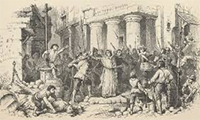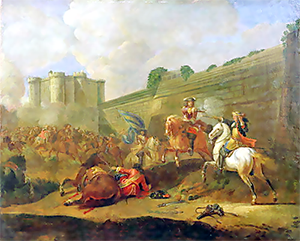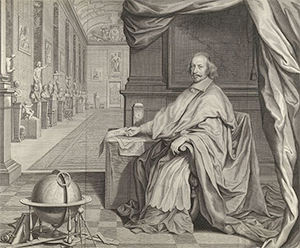Cardinal Mazarin: Chief Minister to Louis XIV
Part 2: Surviving and Thriving The twin treaties that made up that Peace did not end the fighting between France and Spain, however. The two countries fought on. Mazarin engineered the formation of the League of the Rhine, an alliance between his country and the German states that were closest to it, and also made an agreement with England, handing over the fort of Dunkirk in exchange for English assistance against Spain. He tried unsuccessfully in 1657 to have Louis XIV elected Holy Roman Emperor. 
Coinciding with the long war with Spain, even caused by it, were a host of new and higher taxes, to which many leading Parisians objected. Beginning in the year of the Peace of Westphalia, a large number of discontented workers turned to a low level of violence, taking out their frustrations with the taxes by flinging stones at the window's of Mazarin's entourage. Many of those who threw the stones used a children's sling known as a fronde, and the movement that mushroomed out of such actions came to be known as the Fronde. Mazarin and the regent Anne responded with a heavy hand, arresting the leaders of the movement after the parlement had moved to revoke the king's authority and refused to allow new taxes. (The arrests occurred on the same day as a celebration of France's significant victory over Spain at the Battle of Lens.) The response was more violence, as Paris descended into riots and barricaded streets. A leader of this movement was Louis, Grand Condé, a Thirty Years War hero and formally an ally of Louis and Mazarin. The vast majority of the French armed forces were still fighting in the Thirty Years War, and so the crown had to make concessions, including the release of those arrested and the promise of a number of reforms. As well, royal officials fled the capital. French troops returned once the Thirty Years War had ended and besieged Paris. The two sides signed a truce that lasted for several months. Again, Mazarin ordered arrests of rebel leaders; again, this resulted in a violent response. Mazarin, fearing for his life, again fled Paris. 
By April 1651, the Fronde leaders were exhausted. The streets of Paris were relatively free of violence for a several weeks. At the end of that year, Mazarin marched back into Paris at head of an armed force. The fighting began anew, at one point descending into internecine conflict, as rebel leaders disagreed on strategy and policy. However, a rejuvenated Fronde had enough clout to force Mazarin again into exile. In October 1652, King Louis XIV, of an age to rule in his own right, stormed back into the city, recalled Mazarin, and restored order. Members of the Fronde fought on for a time, but the movement was over by the end of the summer of 1653, with French troops under Marshal Turenne finally finishing off the resistance. Mazarin, once again in control of the situation, turned back whatever promises of reform had been made in the heat of battle, and the potential for Louis XIV to emerge as an absolute monarch was higher. He was crowned the following year. During the Fronde, those in rebellion sang Mazarinades, which were songs that mocked the chief minister. Their target had a sense of humor and, after the rebellion was done, encouraged a public performance of some of them in a concert at the royal palace. A combination of French victories and Spanish exhaustion brought both sides to the negotiating table, and the two nations signed the Peace of the Pyrenees on Nov. 7, 1659. France gained more territory, including part of the Low Countries. To maintain the peace, Louis XIV married Maria Theresa of Spain. 
Mazarin maintained his love of the arts and filled his mansion in Paris with many famous works of art. (This is today the home of the Bibliothéque Nationale. He was a patron to several artists and founded the Royal Academy of Painting and Sculpture, in 1648. He also introduced Italian opera to an at first but eventually adoring French population. When Mazarin died two years later, on March 9, 1661, the Sun King carried on without a chief minister. He was, after all, the state. First page > To the Pinnacle of Power > Page 1, 2 |
|
Social Studies for Kids
copyright 2002–2026
David White




